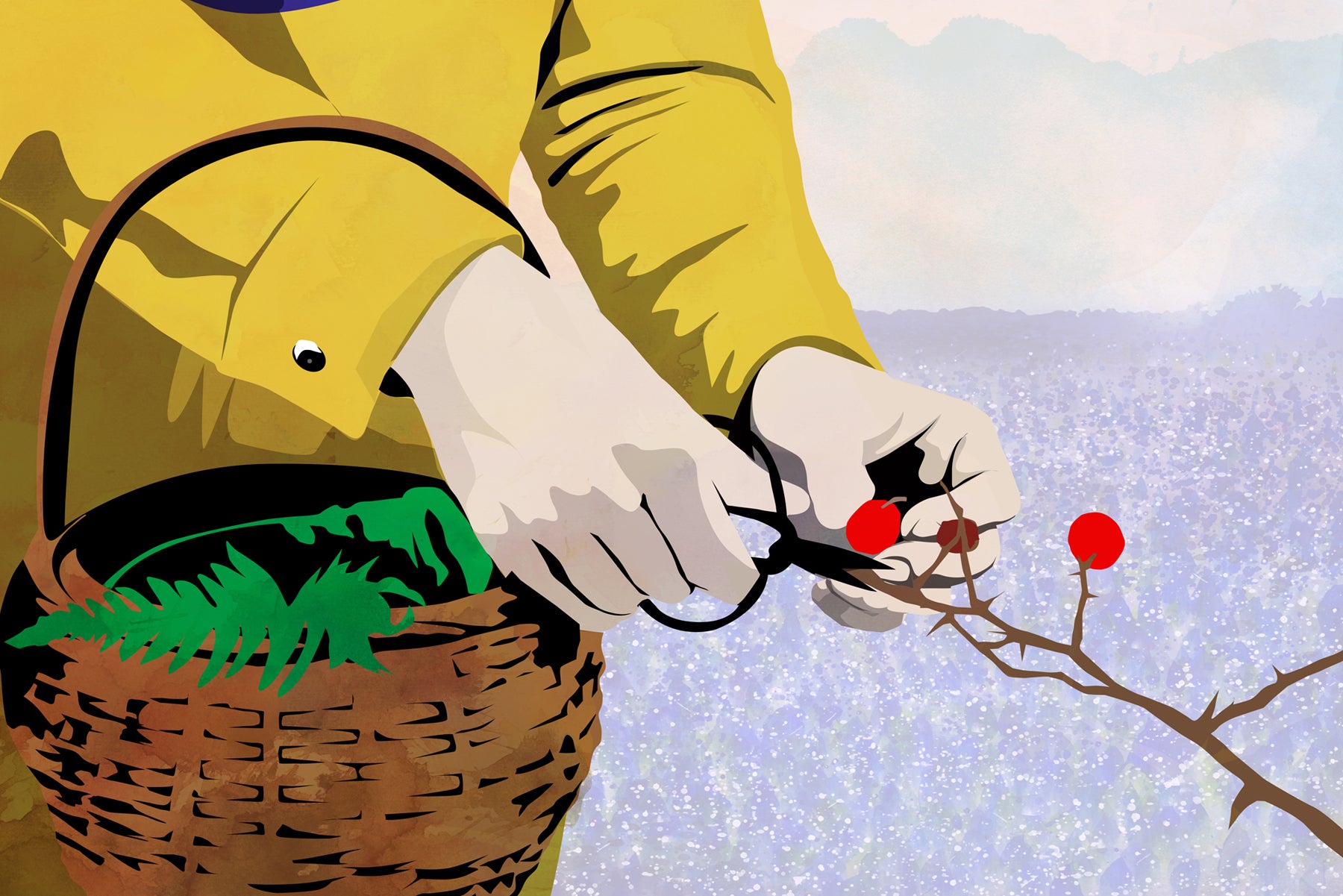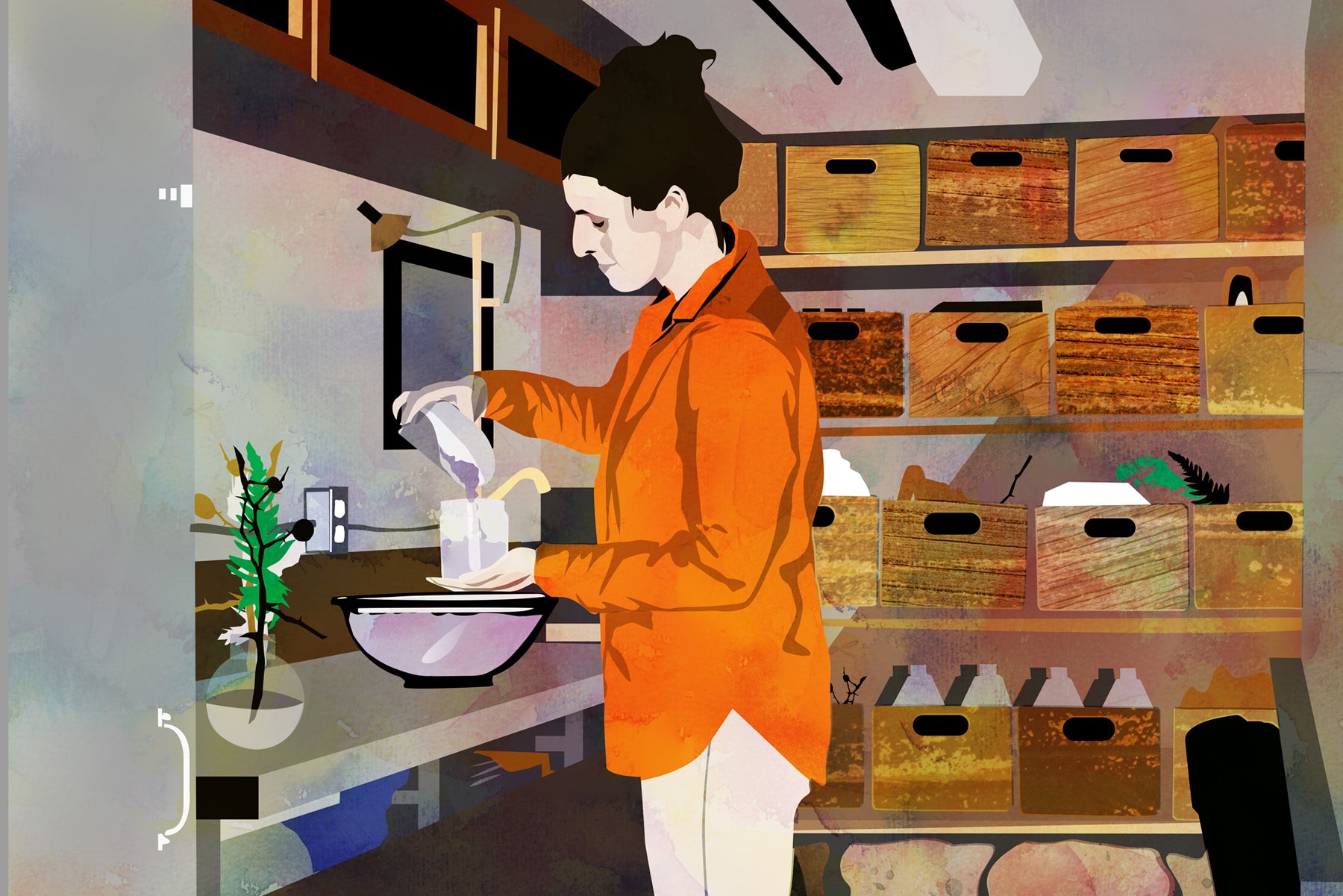One summer morning, Raphaëlle Gagnon and Mark Coelho woke up as usual in their tiny home—a converted vintage Greyhound bus. They enjoyed toast and coffee and headed out to their workshop: a trailer and mobile “wilderness lab” where they make botanically infused soaps, salts, lotions, and oils.
The girlfriend-boyfriend team behind Boreal Folk Apothecary had been to dozens of Canada’s most beautiful places over the past few years, harvesting wild plants for their formulations, but this morning was something special: a dozen wild horses stood grazing not 30 yards away, against a backdrop of the Rocky Mountains. “That had to be the top,” Mark says. “I think we share the same sentiment about that.”
They shared a dream of living exactly like this.
When Mark and Raphaëlle met in 2014, they quickly realized they shared a dream of living exactly like this: close to nature, self-sufficient, in the great outdoors. (Their first date was a two-month road trip around Vancouver Island—but that’s another story.)
At the time, Raphaëlle, now in her 30s, was finishing up her ninth season of tree planting and wondering what to do next. She’d taken a natural soap-making workshop and really liked it; it was Mark, a “jack-of-all-trades” designer, maker, and mechanic, who said he could help turn her passion into a living. “At some point, I promised her I’d turn my [Purolator] van, which was a grungy mechanic van at the time, into a soap van she could take to farmers' markets,” Mark says.
He kept his word. The following year, Raphaëlle studied herbalism and organic skin-care science while Mark worked on converting his van into a home for two with “a little formulating area in the corner.” They bought a mining claim in northern BC and moved up in September 2015. For two months, they harvested plants and experimented with products, which did well at farmers' markets.

Business grew, and the duo realized there was a demand for their products. In 2016, they bought the big cargo trailer that Mark would spend six months turning into the wilderness lab: a 99-square-foot workspace complete with a sink, propane burners, and solar electricity. “He handcrafted the entire trailer—we’re talking manually threading each plumbers’ pipe,” says Raphaëlle. “And it’s just, like, a really beautiful space.”
With its 100-year-old sink, white tile floor, and stainless steel counters offset by refurbished wood cabinetry, and copper hardware, the lab’s aesthetic is artisanal chic, the kind of thing you might see in a hip Brooklyn coffee shop.
To have something to live in, they traded in the Purolator van and bought an old Greyhound bus that had already been retrofitted. 2017 was their first with the new setup. With the big diesel bus hauling the trailer, they covered 7,000 kilometers across Alberta and BC. Stints in the backcountry, where they spent weeks or months wildcrafting and manufacturing (on crown land or public access zones, where harvesting is permitted), were punctuated by visits to markets and festivals in different cities. And business is booming: Raphaëlle says they have earned the equivalent of two decent full-time salaries.

Not having an address is “definitely difficult,” Raphaëlle says. Their raw materials must be shipped somewhere throughout the year, and because they move around, a PO box isn’t practical. Instead they enlist the help of friends and family across western Canada willing to receive, say, 500 pounds of glacial salt or mineral clay from the prairies.
Their wilderness lifestyle means they’re often offline.
Relying on a 50-year-old bus to get to their next vending opportunity has been challenging at times. “There’s always something that’s going to go with a vehicle of that vintage,” says Raphaëlle, laughing. She says Mark is able to repair any mechanical issues that arise, and they pad their travel time. If it’s an eight-hour drive to their next market, Raphaëlle says they’ll give themselves two or three days to get there. “This summer there were only a few very minor hiccups,” Raphaëlle says. “But we never missed an event.”
And what about the personal challenges of living in such close quarters with the same person, all the time? Sure, there are times one of them needs to just go for a walk, and they talk things over a lot. But they recognize that “it’s been a unique relationship from the start,” Raphaëlle says, “just living this crazy dream of ours.”
Words by Cal Cook
Feature image by Alvaro Tapia Hidalgo
